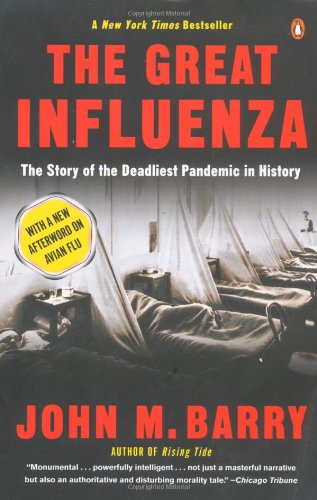The fourteenth book I read in 2015 is The Great Influenza: The Story of the Deadliest Pandemic in History by John M. Barry. With a historical event so harrowing, it's amazing how dry and uninteresting this book is.
It opens with a lengthy examination of the life and career of William Henry Welch. The man never married, had any intimate relationships, either romantic or platonic, or made any important scientific discoveries, but he was a consummate bureaucrat who recommended other men for prominent positions in science! Sadly, none of these other men actually made any contributions to defeating what became known as the Spanish flu, either, but Barry admires them greatly and wants you to admire them, too! He actually dedicates the book to and spends the prologue on a Welch protege who ... also doesn't do anything about the influenza epidemic but later dies in what might be a tragic irony or a clever suicide!
Honestly, The Andromeda Strain this isn't, but if you want to read a well-done (albeit fictional) book about a possible outbreak in which nothing much actually happens but the tension is high and the characters are compelling, read that one. Barry spends all his time on the ultimately boring lives of scientists who utterly failed to end the influenza pandemic of 1918 rather than on the victims whose story might at least be moving if no more heroic. When he does mention a victim in passing, rather than merely citing statistics, it's in the vein of "So-and-so was dead five hours later. She was only twenty-three." No details about her life before getting sick, about her family or ambitions or accomplishments; we're just supposed to get choked up, I suppose, because she died young.
There are a couple of interesting tidbits buried in the text. The pandemic took the name Spanish flu not because it was any more widespread in Spain than anywhere else but because wartime censorship in other countries caused its prevalence to be covered up. This particular strain of flu killed primarily young and healthy people precisely because their immune response was so strong and vital: it reacted so aggressively to the invasion that the victims basically drowned in the effluvia of dead cells that collected in their lungs as a result of the scorched earth response. But the moments of genuine interest are far and few between.
You'll note that the cover pictured above advertises "a new afterword on avian flu." The copy I have has "a new afterword on H1N1 (swine) flu." Barry proudly announces that he was invited to participate in a government panel planning the response to the next pandemic, and he is desperate to prove his relevance. It's not a matter of if, but when! He spends a great deal of time decrying the cover-ups and minimization of the danger of the disease by contemporary media and governments and praises the more aboveboard response of San Francisco, promoting the wearing of masks and distribution of a supposed vaccine, only to admit that neither the masks nor the vaccine actually had the ability to slow the spread of the disease so the San Franciscans response to the flu was, in practice, no better than that of other cities which urged their citizens not to curtail their normal activities. So the moral of the story is...?
Sunday, March 15, 2015
Subscribe to:
Post Comments (Atom)
Blog Archive
Labels
- Agatha Christie (3)
- Alexander McCall Smith (23)
- apologia pro sua vita (49)
- Art Linkletter (29)
- Austeniana (10)
- bibliography (248)
- birthday (21)
- Charles Lenox (3)
- Christmas (29)
- deep thoughts by Jack Handy (16)
- Grantchester Mysteries (4)
- Halloween (10)
- high horse (55)
- Holly Homemaker (19)
- Hornblower (3)
- Inspector Alan Grant (6)
- Isabel Dalhousie (8)
- life-changing magic! (5)
- Lord Peter Wimsey (6)
- Maisie Dobbs (9)
- Mark Forsyth (2)
- Mother-Daughter Book Club (9)
- No. 1 Ladies' Detective Agency (14)
- photo opportunity (103)
- pop goes the culture (73)
- rampant silliness (17)
- refrigerator door (11)
- Rosemary Sutcliff (9)
- something borrowed (73)
- the grandeur that was (11)
- where the time goes (70)

No comments:
Post a Comment